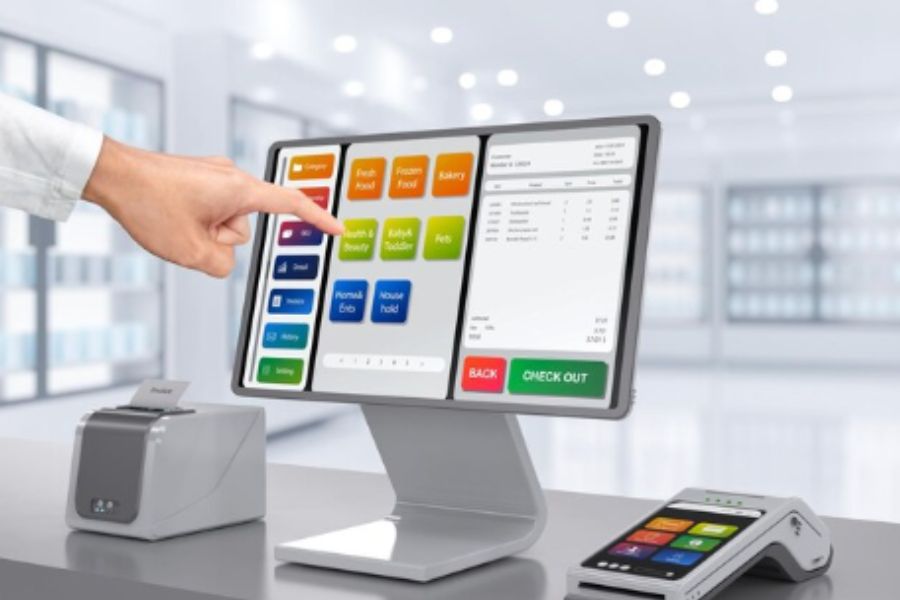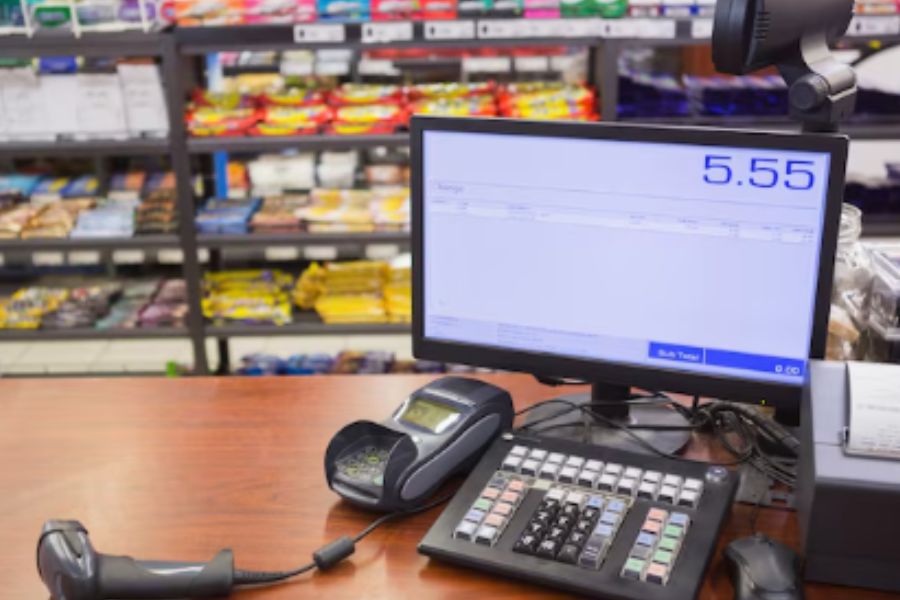In today’s competitive market, a reliable Point of Sale (POS) system is essential for managing transactions, inventory, and customer relationships efficiently. But with so many options available, how do you choose the best one for your business? Don’t worry, we will give you the best POS system for retail clothing store. Whether you’re a boutique owner or managing a large-scale fashion outlet, this expert guide will navigate you through the features, benefits, and considerations of each system, empowering you to make the right choice for your unique needs.
Let’s explore them in this article!
What is a POS System? How Does It Work?
A POS system, or point of sale system, is a combination of hardware and software used by businesses to facilitate transactions with customers. At its core, a POS system serves as the central hub for processing sales, accepting payments, and managing inventory.
It replaces traditional cash registers with advanced technology that offers a wide range of capabilities beyond simple transaction processing.
Understanding the inner workings of a POS system involves exploring its functionality across different stages of a typical transaction:
- Product selection: When a customer selects items for purchase, the cashier or sales associate uses the POS system to add them to the transaction. This is done either by scanning the product barcodes using the barcode scanner or manually inputting product codes.
- Transaction processing: Once all items have been added to the transaction, the POS system calculates the total amount due, including any applicable taxes or discounts. The customer then chooses their preferred payment method, whether it’s cash, credit/debit card, or another form of payment.
- Payment processing: If the customer opts to pay by card, the POS system communicates with the payment processor to authorize the transaction. This involves verifying the card details, checking for available funds, and encrypting the transaction data to ensure security.
- Receipt generation: Upon successful payment authorization, the POS system generates a receipt for the customer. This receipt typically includes details such as the date and time of the transaction, an itemized list of purchased items, the total amount paid, and any applicable discounts or promotions.
- Inventory management: Simultaneously, the POS system updates the inventory records to reflect the items that have been sold. This real-time inventory tracking helps businesses keep accurate stock counts, identify popular products, and reorder inventory as needed.
- Reporting and analysis: In the background, the POS system collects transaction data and generates comprehensive reports for business owners and managers. These reports provide insights into sales trends, customer preferences, and inventory turnover, empowering businesses to make data-driven decisions.
Key Features to Look for in the Best POS System for Retail Clothing Store
A robust POS system tailored to the specific needs of a retail clothing store POS can streamline operations, enhance the customer experience, and drive business growth. To help you navigate the myriad options available, we will give you the key features to look for when choosing the best POS system for your retail clothing store.
Searching and Managing Inventory
Efficient inventory management lies at the heart of a successful retail clothing store. Look for a POS system equipped with advanced inventory management capabilities, such as real-time inventory tracking, automatic stock replenishment alerts, and the ability to categorize products based on size, color, and style.
Additionally, features like barcode scanning and bulk product import/export can streamline the process of adding and updating inventory, saving time and minimizing errors.
Integrating Accounting Systems
Seamless integration with accounting software is essential for maintaining accurate financial records and streamlining bookkeeping tasks. Opt for a POS system that integrates seamlessly with popular accounting platforms like QuickBooks or Xero.
This integration ensures that sales data, expenses, and inventory updates are automatically synced between the POS system and accounting software, eliminating the need for manual data entry and reducing the risk of errors.
Ensuring Scalability and Fostering Growth
As your retail clothing store grows, your POS system should be able to grow with it. Choose a POS system that offers scalability and customization options to accommodate changing business needs and expansion plans.
Look for features such as multi-store support, centralized inventory management, and the ability to add new users and locations easily. Scalability ensures that your POS system can adapt to the evolving needs of your business without requiring a complete overhaul.
Offering Flexible Payment Methods
In today’s digital age, offering flexible payment options is crucial for accommodating diverse customer preferences and increasing sales. Look for a POS system that supports a wide range of payment methods, including credit/debit cards, mobile payments, and digital wallets like Apple Pay and Google Pay.
Moreover, consider features like split payments, installment plans, and gift card support to cater to the needs of different customer segments and enhance the shopping experience.
Seamlessly Integrating Payment Processing
Efficient payment processing is essential for ensuring fast and secure transactions at the checkout counter. Choose the best POS system for retail clothing store that offers seamless integration with reputable payment processors to facilitate quick and reliable payment processing.
Features like EMV chip card compatibility, PCI compliance, and end-to-end encryption help protect sensitive customer data and minimize the risk of fraud or security breaches.
Enhancing Mobility
Empowering your staff with mobile POS capabilities can significantly improve customer service and streamline operations in a retail clothing store. Look for a POS system that offers mobile-friendly features, such as handheld devices for processing transactions on the sales floor, wireless barcode scanners for inventory management, and mobile apps for accessing sales data and analytics on the go.
Mobile POS capabilities enable staff to assist customers more effectively, reduce wait times, and improve overall efficiency.
Embracing Omnichannel Capabilities
In today’s omnichannel retail landscape, providing a seamless shopping experience across multiple channels is essential for staying competitive. Choose a POS system that embraces omnichannel capabilities, allowing customers to shop online, in-store, and via mobile devices with ease.
Such as integrated e-commerce platforms, click-and-collect options, and centralized inventory management to ensure consistency across all sales channels and enhance customer satisfaction.
Prioritizing Compliance and Security
With the increasing prevalence of data breaches and cyber threats, prioritizing compliance and security is non-negotiable when choosing a POS system for your retail clothing store. Look for a POS system that adheres to industry standards and regulations, such as PCI DSS compliance for payment security.
Additionally, features like user access controls, data encryption, and regular security updates help protect sensitive customer information and safeguard your business against potential risks.
Managing Customers and Loyalty Effectively
Building and maintaining customer relationships is key to driving repeat business and fostering loyalty in a retail clothing store. Choose a POS system that includes robust customer relationship management (CRM POS) features, such as customer profiles, purchase history tracking, and loyalty program integration.
These features enable you to personalize the shopping experience, reward loyal customers, and target promotions based on individual preferences and behavior.
Utilizing Analytics and Generating Reports
Data-driven insights are invaluable for making informed business decisions and optimizing performance in a retail clothing store. Look for a POS system that offers comprehensive reporting and analytics tools, allowing you to track sales trends, monitor inventory turnover, and analyze customer behavior.
Features like customizable reports, real-time dashboards, and predictive analytics empower you to identify growth opportunities, optimize inventory management, and refine marketing strategies.
In short, selecting the best POS system for your retail clothing store involves considering a range of factors, from inventory management and payment processing to scalability and security.
Top 7 Best POS Systems Tailored For Retail Clothing Stores
In this part, we will unveil the best POS system for retail clothing store, providing insights into the features, pros, and cons.
ConnectPOS
ConnectPOS is the first POS system, which stands out as a robust POS system designed to elevate retail experiences for clothing stores. With its intuitive interface and seamless integration capabilities, ConnectPOS empowers retailers to manage transactions efficiently while delivering personalized customer service.
Key Features:
- Real-time inventory tracking: Keep your inventory up-to-date with ConnectPOS’s real-time tracking, preventing stockouts and overstock situations.
- Mobile point of sale: Enhance customer service by processing transactions directly on mobile devices, providing a personalized and efficient shopping experience.
- Omnichannel integration: Seamlessly connect your online and offline channels, ensuring a consistent and cohesive experience for your customers.
- Customer loyalty program: Build customer loyalty with customizable loyalty programs, encouraging repeat business and fostering long-term relationships.
Pros:
- User-friendly interface for easy navigation.
- Robust reporting and analytics tools for data-driven insights.
- Responsive customer support for timely assistance.
- Scalable solution adaptable to growing businesses.
Cons:
- Limited offline functionality in case of internet outages.
Lightspeed
Lightspeed is renowned for its comprehensive suite of retail management tools, including the best POS system for retail clothing store. Its cloud-based architecture ensures accessibility and scalability for businesses of all sizes.
Key Features:
- Advanced reporting and analytics: Gain valuable insights into your business performance with Lightspeed’s detailed reporting and analytics tools.
- Employee management: Effectively manage staff roles, permissions, and schedules, enhancing overall operational efficiency.
- E-commerce integration: Seamlessly integrate your online store with the POS system, creating a unified shopping experience for your customers.
Pros:
- Intuitive interface for easy adoption by staff.
- Extensive integrations with third-party applications for added functionality.
- Robust reporting tools for actionable insights.
- Dedicated support team for technical assistance.
Cons:
- Additional fees may apply for certain integrations or advanced features.
- The learning curve for mastering all functionalities.
Vend
Vend is also a popular POS system known for its simplicity and scalability, making it an ideal choice for clothing stores of all sizes. With its easy setup and intuitive interface, Vend helps retailers streamline their operations and focus on growing their business.
Key Features:
- Easy setup and installation process for quick deployment
- Inventory management tools to track stock levels and manage product variations
- Customer loyalty programs to reward repeat shoppers and drive sales
- Reporting and analytics to gain insights into sales performance and customer behavior
- Offline functionality to ensure business continuity even during internet outages
Pros:
- Intuitive interface for ease of use
- Seamless integration with popular e-commerce platforms
- Robust inventory tracking capabilities
- Responsive customer support for timely assistance
Cons:
- Limited customization options for advanced users
- Some features may require additional fees
Square
Square is the next POS system known for its simplicity and affordability, offering a range of features tailored to the needs of retail clothing stores.
Key Features:
- Intuitive touchscreen interface for fast and efficient transactions.
- Inventory management tools with low-stock alerts and automatic reordering.
- Built-in marketing tools including email campaigns and customer feedback.
- Offline mode for uninterrupted operations during internet outages.
Pros:
- No monthly fees, making it affordable for small businesses.
- Customizable features and add-ons to tailor the system to specific needs.
- Access to Square’s ecosystem of business tools and services.
- Reliable customer support through multiple channels.
Cons:
- Limited customization options compared to some competitors.
- Advanced features may require additional hardware or software purchases.
ShopifyPOS
Next, ShopifyPOS is a robust POS system integrated with Shopify’s e-commerce platform, offering a seamless omnichannel experience for retail clothing stores.
Key features:
- Seamless synchronization between online and offline sales channels.
- Advanced inventory management with product variants and SKU tracking.
- Customer profiles for personalized shopping experiences and targeted marketing.
- Built-in reporting tools for analyzing sales performance and customer behavior.
Pros:
- Unified platform for managing all aspects of retail operations.
- Extensive app marketplace for additional functionalities and integrations.
- Responsive customer support with 24/7 assistance available.
- Regular updates and feature enhancements to improve functionality.
Cons:
- Higher pricing tiers may be prohibitive for small businesses.
- Limited customization options compared to standalone POS systems.
eHopper
eHopper is a feature-rich POS system designed to meet the diverse needs of retail businesses, offering a range of tools to streamline operations and enhance customer experience.
Key Features:
- Intuitive interface with customizable workflows for efficient operations.
- Inventory management with low-stock alerts and automatic reorder points.
- Customer relationship management tools for personalized marketing campaigns.
- Extensive reporting and analytics for performance tracking and optimization.
Pros:
- Intuitive interface with easy setup and navigation.
- Affordable pricing plans with no long-term contracts required.
- Responsive customer support through multiple channels.
- Regular updates and feature enhancements based on user feedback.
Cons:
- Limited scalability for growing businesses with complex needs.
- Some advanced features may require additional subscription tiers.
Zettle
Zettle is a comprehensive POS system offering a range of features tailored to the needs of retail clothing stores, with a focus on simplicity and affordability.
Key Features:
- Simple setup with an intuitive interface for quick adoption.
- Inventory tracking with low-stock alerts and automatic reorder suggestions.
- Integrated payment processing with options for contactless payments.
- Customizable receipts and reporting tools for tracking sales performance.
Pros:
- No monthly fees, making it cost-effective for small businesses.
- Seamless integration with Zettle’s ecosystem of business tools and services.
- Responsive customer support with online resources and live chat.
- Regular updates and improvements to enhance functionality.
Cons:
- Limited customization options compared to more robust POS systems.
- Transaction fees may be higher for businesses with high sales volumes.
FAQs: Best POS System for Retail Clothing Store
Can I Integrate a POS System with my Online Store?
Yes, most modern POS systems offer seamless integration with e-commerce platforms, allowing you to sync inventory, sales data, and customer information across online and offline channels.
What are the Common Challenges When Implementing a POS System?
Common challenges when implementing a POS system include staff training, data migration, hardware compatibility issues, and ensuring compliance with industry regulations.
Conclusion
Choosing the right POS system is crucial for the success of a retail clothing store, as it directly impacts operations, customer experiences, and overall profitability. By considering key features such as inventory management, payment processing, and scalability, retailers can select a POS system that meets their specific needs and facilitates growth. With the top 7 POS systems outlined in this guide, along with answers to common questions, retailers are empowered to make informed decisions and take their businesses to new heights in today’s competitive retail landscape.
Contact us today to understand more about the best POS system for retail clothing store.



